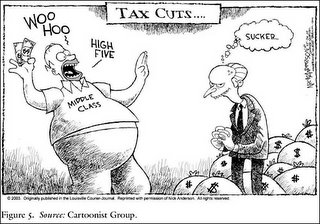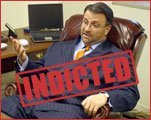Stephen Harper and George Bush (planning the next Canadian election)?
Please forgive me if I do not get excited when Mr. Harper talks about ethics. A man who prior to even being elected is threatening the basic civil rights of a goodly segment of the population, including women's reproductive rights AND gay rights, while the CBC gives him a free ride on all the statements he has made prior to his recent Americanized spin machine.
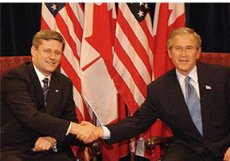 http://thetyee.ca/Views/2005/12/16/HarperToughSell/Harper's Tough Sell for 'Change' Sowing distrust oddly, he can't afford to really say what he'd change.
http://thetyee.ca/Views/2005/12/16/HarperToughSell/Harper's Tough Sell for 'Change' Sowing distrust oddly, he can't afford to really say what he'd change.By Stan Persky
Published: December 16, 2005
TheTyee.ca
Canadians can be forgiven for thinking that the forthcoming January 23, 2006 federal election is an unnecessary exercise in snow and slush, totally devoid of issues and featuring political leaders that no one really wants to vote for. That formulation is more or less true, with one small exception, namely, that the election, wanted or not, will actually happen and, therefore, will have consequences for the country. Alas, it matters.
Now that we've had more than a fortnight of the snoringly-long, two-part (pre and post-Xmas) campaign, naturally, you are already completely fuzzified and ready to drown yourself in fortified eggnog. You've come to the right site. Herewith, a complete explanation:
First, why are we having a winter election when a nice spring election was already promised? Two reasons: 1) Stephen Harper's neo-Conservatives would prefer electoral conditions in which diehard cranks will be more motivated to vote than laid-back citizens who think things are pretty much okay, and 2) sandbox politics, i.e., the leaders of the opposition parties (Harper, Duceppe of the Bloc Quebecois, and the NDP's Jack Layton) wanted to kick sand in the face of Prime Minister Paul Martin. By showing they could "bring down the government" rather than allowing the regime to call the election, said leaders believe that a teensy psychological advantage accrues to their side of the teeter-totter. Is this mainly macho posturing? Yes. Is a winter election in the public interest in any way? No. (Aren't short answers nice?)
Second, the Change Mantra. In his first speech out of the chute, Harper reached for the word "change" more than 20 times. The use of this term is meant to have a conventional meaning agreed upon by pollsters and punditti, and understood by the public: since the present government has been in office for a dozen years and a quartet of elections, therefore, the people allegedly/must/should (choose one) want a change.
Small change
What gets lost in the Change Mantra is that almost no one asks, "What, exactly, do we want to change?" It's worth asking. On the face of it, it doesn't look like we need a big change, apart from making sure that we don't have another Sponsorship Scandal (and that, supposedly, is being taken care of by the Martin-appointed Gomery Commission, even if the opposition parties were too impatient to wait for the judge's final report). The country is at peace; terrorism is minimal (it's mainly confined to ethnic gang members who shoot each other -- what one wag calls "niche terrorism"); we have the lowest unemployment in 30 years; there have been balanced budgets and big surpluses for about ten years in a row now; plus we have a raft of policies and lots of cash in the pipe for health care, environmental cleanup through the Kyoto Accord, urban infrastructure renewal, day care, equal rights, post-secondary education and all the rest. What, exactly, needs to be changed? Most citizens of thriving democracies elsewhere would say: not much.
In this election, it's considered impolite to "demonize" Conservative leader Harper or to suggest he has a "hidden agenda," as happened in the 2004 campaign. But the truth is, Harper isn't able to say aloud what he'd like to change in Canada, because if he did, he wouldn't even have a chance to achieve a minority government, one of the more possible outcomes in this contest. In fact, the only hint of what he (and/or a major segment of his party) would like to change came in his first policy announcement, a promise to hold a free vote in parliament to repeal the same-sex marriage law. The announcement was made early in the campaign, primarily to signal to his "social conservative" base that the leader is still onside in the movement's campaign to impose public morality. Harper, if not the party's more wingnut base, knows that this is not a vote-getter and so he got it out of the way early and incoherently (ban same-sex marriages, he said, but permit the 3,000 gay and lesbian marriages that have already been solemnized -- in logic, that's called a contradiction), and he has since stuck to more conventional policy ploys about taxes, health care and kids.
If there were any investigative reporting left in Canadian journalism, an enterprising reporter could survey the Conservative candidates and find out just how many of them are connected to the not-so-hidden agendas of various right-wing, Xtian fundamentalist organizations like Focus on the Family, Christian Fellowship and sundry others. That might tell us more about what Conservatives believe (and want to do) than anything the bland Mr. Harper is going to blandly not say. The agenda, hidden or not, of the Conservatives is to diminish the social democratic character of Canadian government and society, privatize as many decisions as possible (hence, for example, a Conservative toddler bonus for parents as opposed to the Liberals' funding of a national day care program), and, ironically, for people committed to "minimalist" government, to use government instruments to implement a particular and regressive notion of social morality in opposition to both the individual rights protected in the Canadian Constitution and the social policies developed over decades.
In sum: Do we need big change in Canada right now? Not really. Do we need Harper's version of change (either hidden or overt)? Not at all. Even if the Liberals have been in office too long, is Harper the change we ought to want? No, thanks.
In Gomery we trust
Third, the Trust Factor. This is a two-part issue: 1) is the Martin Liberal government especially corrupt?, and 2) are Canadians justified in not trusting politicians? No. And no.
The major claim of corruption, the Sponsorship Scandal, which occurred a decade ago in Quebec during the Chretien regime, and was slowly uncovered, investigated, and made too much of during the last two years, is, despite much hyperbole, a relatively small bit of corruption. Oh, of course, it's awful, shouldn't happen, should be stopped, etc. Judge Gomery, we await some wisdom. But is the scandal characteristic of Canadian politics, or even Liberal Party politics? Not really. Is it characteristic of the greased hand Liberal Party politics of Quebec in the last half century? Yes. Is it over now? Pretty much. Does Paul Martin have anything to do with any of this? Only marginally. Does the Sponsorship Scandal represent a present and continuing danger to life in Canada? Nope.
The distrust of public officials, of politicians, of "government" in general, is a far murkier issue. A public mood of government distrust has developed over the past decade or, I would be tempted to say, has been created. Created by whom? Media, right-wing thinktanks, partisans of parochial interests and a culture of resentment. That's too vague, I know, to stand up as an analysis of a social process that isn't a conspiracy. But every time a CanWest Global TV newscaster or National Post op-ed piece sneers at some harmless but fallible government program and offers an insinuating wink to give viewers and readers the idea that we all know that government is hypocrisy, hoax, and reckless waste of our of "hard-earned unfairly taxed-away dollars," it's one more drop in the distrust bucket.
Is the distrust justified? No, not really. Are there lots of criticisms to make about the shortcomings of government programs and performance? Sure. Does government work pretty well in this country? Yes, but why are we so reluctant to admit it? Do you have to bribe a public official, who's the brother-in-law of the local MP, to get a driver's license, a passport, a permit? No, and the public official isn't the brother-in-law of the local MP. If you don't believe me, go to any available Absurdistan and watch corrupt bureaucracy at work.
Truth about taxes
Finally, some mopping-up. Elections mean talk about taxes. Don't pay too much attention to the talk. Harper offers a GST tax cut, Martin offers a general tax cut. Even conservative economists deride Harper's offer as cheap politicking. Does anyone have anything interesting to say about taxes? Yes, the NDP's Jack Layton, who says, don't cut taxes, don't raise taxes. The present taxation level, which generates big surpluses, is a good thing. Use the surpluses to finance social programs. Perfectly sensible formula, even if it is unlikely to generate waves of popular enthusiasm. But you wanted the truth, right?
Last bit of mop-up. Who got it right so far? Buzz Hargrove, union leader of the United Autoworkers who, at the end of week one, went public to say, we ought to re-elect the Martin Liberal government, and provide enough additional NDP seats to form a majority coalition. At least one prominent NDP supporter recognizes that the only important thing about this election is to make sure that Harper and the Conservatives do not become the next government of Canada.
Okay, you are now, as they say in Scientology, "cleared," and are fully prepared to enter a voting booth at the end of January. Until then, feel free to hit the snooze button.
Stan Persky teaches philosophy at Capilano College in North Vancouver

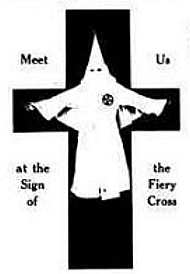
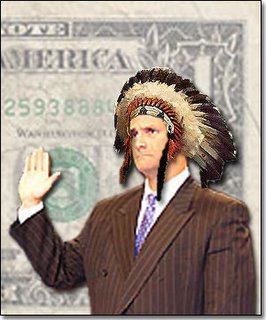

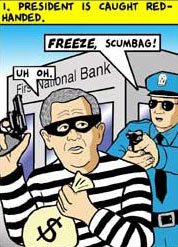 Molly Ivins has been raising hell and speaking truth to the corrupt Bush administration for some time.
Molly Ivins has been raising hell and speaking truth to the corrupt Bush administration for some time. 


